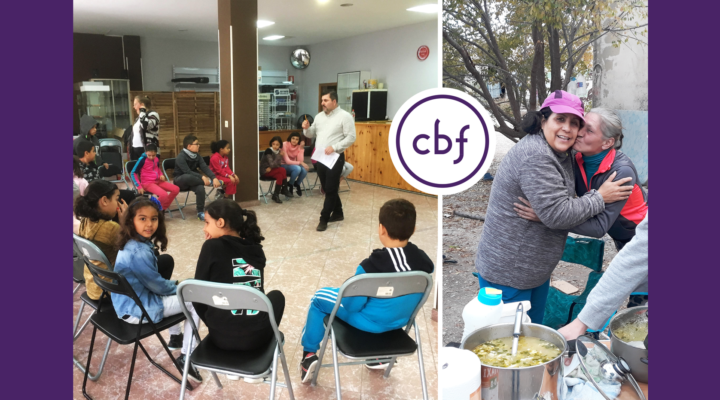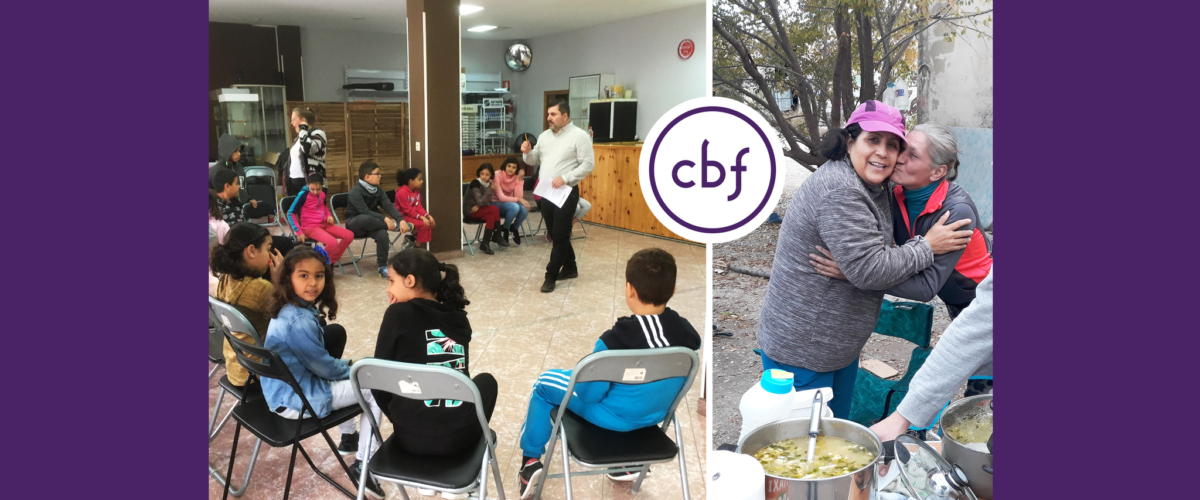By Ashleigh Bugg
Along the coast of southern Spain lies Playa de los Muertos or Beach of the Dead. It is a popular spot for locals and tourists enjoying the pristine shoreline made of pebbles which give the water its clear, turquoise color. However, the beach, as its name suggests, reveals the harsh reality for Spain and Europe in general, as the global refugee crisis worsens.

CBF field personnel Macarena Aldape (left) ministers to newly-arrived refugees in Albacete, Spain.
“They call it Beach of the Dead because of the number of bodies that have washed up along its shores,” said Cooperative Baptist Fellowship field personnel Eddie Aldape.
Historically, cadavers once found there belonged to lost or shipwrecked sailors. Today, authorities have found the bodies of refugees, asylum-seekers and other neighbors searching for safety when their boats or rafts capsized. People are fleeing their countries of origin as the worldwide refugee crisis grows. With more than 60 million displaced, the number of people forced from their homes has reached levels not seen since the Second World War. More than 50 percent are children.
Various CBF-assisted groups and personnel, including Macarena and Eddie Aldape, work with these neighbors.
“When you see so many people displaced, how can you not show a little bit of love?” Macarena said. “Forget religion; it’s something so human. Any human should be able to do it.”
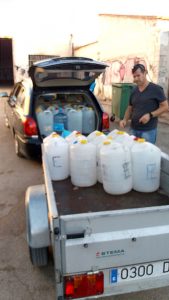
Eddie and Macarena Aldape partner with the Spanish Red Cross,
churches and other groups to assist vulnerable immigrants.
The Aldapes moved to Spain in December 2015, and currently live in the landlocked city of Albacete. However, due to their work with people who come to seaside towns like Roqueta del Mar for jobs, they also collaborate with local churches and organizations along the coast.
Their partners in Spain include the Spanish Red Cross, schools like Colegio de Paz in Albacete, and families like the Madrids from Mexico, who run various social programs including Todos Somos Amigos, a group for children in Roqueta del Mar.
“We work with immigrants, helping them learn Spanish and then for those who are open, we do discipleship,” Eddie said.
“We work with immigrants because many times local churches do not know how to accept them,” Macarena added.
Local governments have been less than thrilled about welcoming new immigrants. Cases may be isolated, and some local officials do not want refugees in their cities. However, the Aldapes maintain that it is imperative to combat this sentiment.
“I want government officials to see the view that things can be done differently,” she said.
Even though anti-immigrant sentiment can be apparent, because of the greenhouses in the region, jobs are available year-round for arrivals.
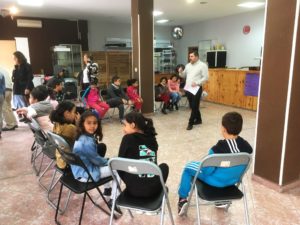
The Aldapes teach English and Castellano Spanish to immigrants that the government often overlooks.
“People here are stable and are ready to learn Spanish and adapt to the culture. They need help to be aware of the new culture they are in and how to interact with that,” Eddie explained.
Eddie encourages arrivals to be open and to help others understand their home cultures as well.
“I tell them that they can teach people about their cultures or religions, such as Islam. Such openness enables people be able to see that an arrival may be ‘just like I am—simply with different beliefs.’”
“People just want to be who they are,” Macarena added.
The Aldapes work with arrivals from Burkina Faso, Mali, Kenya, Morocco and various West African nations. They have helped people from Pakistan as well as Turkey, Romania, Cuba, Venezuela, Ukraine and Poland. They try to assist groups whom the government may overlook, teaching English and Castellano Spanish.
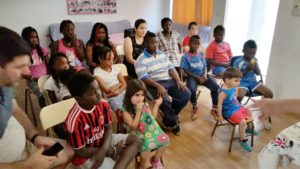
The Aldapes are combating anti-immigrant sentiment, helping immigrants from all around the world to learn and adjust to the new culture.
“Many people want to take lessons, but they can’t afford child care. There’s a lot of help the government offers, but you have to have all your papers,” Eddie said. “These are the people we are trying to reach, those who don’t qualify.”
“We’re here for the people,” Macarena said. “We have to work according to their schedule, not our own.”
A large part of their ministry is literacy.
“We have a lot of people, especially women, but also men, who did not get the same opportunities in their countries to get an education,” Eddie said. “We may be teaching Spanish, but then we find out they can’t write.”
For Eddie, this can be one of the most rewarding aspects of their work.
“To have someone write his or her name for the first time is like a dream come true,” he said. “It’s a huge cornerstone or foundation of that relationship.”
Through literacy projects, they are able to get to know people on a more personal level. The Aldapes also work with Latino partners including a young woman from Mexico who works in Málaga, helping women who are in forced prostitution or who want to leave their situations. They hope to build a network of Latino workers similar to the Latino worker fellowship they were a part of when they served as CBF field personnel in India.
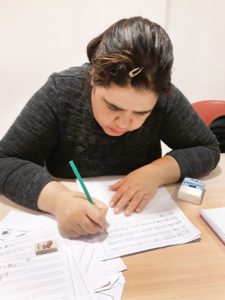
Teaching an immigrant child to write his/her name for first time is like a “dream come true,” the Aldapes said.
“We have built relationships with other people who are Latino,” Macarena explained. “A lot of field personnel from Latin American countries are really isolated and alone. We are getting to know more of the people who are working here,” she said.
Eddie maintains one of the amazing things about their work is hearing people’s stories.
“We know a kid from Gambia who’s 14 years old. When he was 12, he crossed the desert and got to Spain,” Eddie said. “This kid crossed the desert, survived and is still accomplishing so many things.”
He thinks back to the beauty of the coast near where they work.
“We meet people who have come across the Mediterranean on a boat to a beach that, even though it is so beautiful, is called Playa de Muertos because of all these bodies,” he said. “It’s crazy what these people have been through.”
The Aldapes also acknowledge similar issues in the United States.
“We see people complaining in the States or even here, about immigrants; but if you think about it, people don’t want to leave their home or their families behind,” Eddie said.
“They’re here for no other reason than to provide for their families. We see people from Venezuela who stand in line for a piece of bread. We’ve never experienced that. We don’t understand that.”
He says people leave everything behind so their families do not experience further pain.
“The people from Ukraine know their country still has bombings. You don’t see it in the news, but there’s still killings in the streets,” he said.
The Aldapes want people to have a feeling of security.
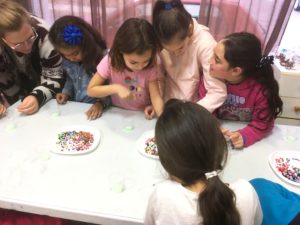
The Aldapes understand the importance of early childhood education, focusing on literacy projects for immigrant children in a safe and fun environment.
“All these people who are coming are leaving really terrible situations and have desperate needs; and we get to do something for them,” Eddie said.
One of their ideas is to create a center called Centro de Esperanza or Center of Hope.
“People come full of hope, and then find it’s hopeless. To give them some kind of hope is what makes it all worthwhile,” Eddie said.
Macarena maintains that while she and Eddie may face struggles, they still have a place to call home.
“It’s not perfect, but we have a nation that will take us at any moment. You think of that and then learn what people have gone through,” she said. “When we think we have done a lot, we’re reassured there’s yet a lot to be done. It keeps us going. We learn something every day.”
Despite the challenges of working with a variety of church partners and in two distinct regions of Spain, the Aldapes are open to change.
“We look forward to it,” Macarena said. “Coming here was like a new beginning. For us, new beginnings are good.”
Give to support CBF field personnel around the world like Eddie and Macarena Aldape to serve and share God’s love. Give today at www.cbf.net/presence

